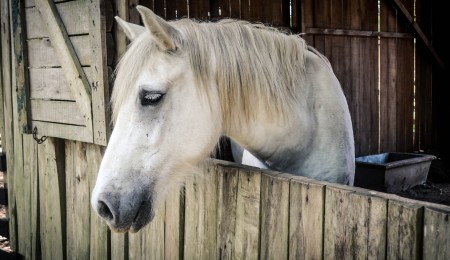
Adults with asthma struggle to breathe when they are exposed to dust and allergens. They can exhale without too much difficulty, but their inflamed lungs with narrowed airways make it hard to inhale enough oxygen, and the mucus in their airways leads to coughing.
When horses have the same symptoms, the condition is called “heaves.” In Ontario, where most horses are stabled indoors much of the time, it’s very common. “Any barn owner with 10 or more horses will know about heaves,” says Dorothee Bienzle, a pathobiology professor at the Ontario Veterinary College.
It’s unknown why some horses develop the condition and others don’t. A susceptible horse will become sick if it is kept in a stall with dusty air, or if it is fed hay that is dusty or mouldy, while other horses that are similar in age and condition remain healthy.
Bienzle’s research aims to discover the underlying genetic factors that lead to these different responses.
She and her colleagues are studying two groups of horses: one that has heaves and one that doesn’t. All the horses will be tested to determine how effectively their lungs are working.
The lungs, whether horse or human, have several different types of cells, says Bienzle. Some have cilia, which move dust particles out of the lungs when they are inhaled. Other cells create surfactants that help coat the inside of the lungs and prevent damage. When a horse has heaves, cells are injured and some die. New cells grow to replace them but they lack the ability to transform into the various types of specialized cells present in a normal healthy lung. That means the horse’s lungs are more vulnerable to future damage.
Bienzle is performing RNA sequencing of the genes in the cells to learn which genes regulate the cell responses. Mutations in genes can affect the proteins that are produced, which in turn affect cell behaviour. Bienzle’s work will not just analyze the genes but use the collected data to determine how the proteins are expressed in relation to the genetic variations.
Not only will this information help veterinarians better understand heaves in horses, it will also contribute to a better understanding of asthma in humans.
Bienzle says the focus for horse owners should be prevention. “This disease is almost 100 per cent preventable,” she says. “Let your horse breathe fresh air and don’t feed dusty or mouldy hay.”
She says the same applies to human asthma cases, although the environment tends to be more complex. Children of smokers or those living in damp basement apartments, for example, are much more likely to develop asthma than those who grow up in environments with good quality air.
“Air quality is so important for both people and animals,” says Bienzle.
